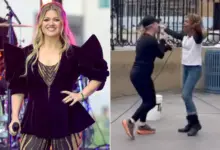In ‘Flipping Boxcars,’ Cedric ‘The Entertainer’ Writes About the Grandfather He Never Knew
In 'Flipping Boxcars' by Cedric Kyles (aka Cedric 'The Entertainer'), the author's grandfather is brought to life as an entrepreneur who sometimes did 'dirty deeds'
:max_bytes(150000):strip_icc():focal(749x0:751x2):format(webp)/9.18.23-book-picks-mag-rollout-12-090623-9b45828cce4d48e49c7863a767e6dd36.jpg)
Better known by his stage name Cedric ‘The Entertainer,’ comedian Cedric Kyles has added a new professional role to his resume: fiction writer. For Kyles, 59, who previously authored 2002’s Grown-A$$ Man, a collection of comedic essays, embarking on a novel was a big step he nearly didn’t take. Initially, Kyles says, he hoped to write a television script about his grandfather, nicknamed Babe, who died before he was born. That morphed into a book project, one he undertook with co-author Alan Eisenstock. The result is Flipping Boxcars, a crime caper coming out September 12.
The book is set in the years after World War II when Babe — named for and based on Kyles’ grandfather, who served in France during the war — has returned home to a world in which the only arena for his talents is the criminal underworld. The title refers to both dice — “flipping boxcars” means rolling double sixes — and the railroad-related scheme Babe is drawn into as he looks for one last big payoff.
Tell me more about Babe. Did you grow up hearing stories about your grandfather?
Yeah, my mother was the youngest of her siblings, and I use her as a muse in the book. She would tell me stories about him. He passed before I was born, so as I started to grow up, I would just have these [ideas about] him and things he would say and do based on these little stories that my mother and my uncles would talk about him. I really love the Walter Mosley kind of writing — those stories of characters in the 1940s and men trying to figure out and find their way through all these little hustles, that they can just figure out how to be an entrepreneur. That’s how much mother described Babe to me. He had a restaurant and he was a gambler and he was also a businessman. He had a liquor store with the sheriff. They also moved black market liquor at times. He was a de facto mayor for the Black side of the town. He would get things done for people.
Where was he from?
Caruthersville, Missouri. Their family all kind of grew up in Arkansas and Tennessee, but I only knew him from Caruthersville.
And then he fought in World War II.
Yeah. So the only image that I have [of him] is in his military uniform. We used to have another image of him in a suit, but the house that we all grew up in, where my grandmother used to live, that house caught on fire a few years back and so a lot of things got lost. My mother knew very little about him as a young man. My uncle, her older brother, knew a little bit more about his military life, so we did some research and then figured out the time that he served and then told that story.
How did you take what little you knew and create a full-blown flesh-and-blood character?
It started because I love the idea of who I believed Babe to be and so I started out trying to write a TV show. The idea was to create a Boardwalk Empire-type show. This idea of these characters and these men who wore suits and did all the dirty deeds of the town and at the same time were the good guys in this very weird way. That was the space where I always saw him existing. And then the opportunity came to write a book, I was like, ‘Well, this is what I would want to write. This world.’
You mentioned Walter Mosley. Who are some other authors that you like?
James McBride is another one who has that same energy that I love. John Grisham, the early stuff, I used to love all those books. Crime stories. You go on a journey inside the story. I love those. I read a lot of biographies, too. I’m reading one on Barry White right now.
:max_bytes(150000):strip_icc():focal(999x0:1001x2):format(webp)/cedric-the-entertainer-123022-5f3e62b18c9247a2a996bc1ca3ecc985.jpg)
Back to Babe. The picture I get from the book is this was a man who was really smart, really hard working, but living in a world where he didn’t have access to a lot of ways to make a living. He was stuck in a box. Would you be that man if you had been born then?
You nailed it. I really feel like at the deepest core, the reason I wrote the book was that I felt like the things that were similar, the things that make me parallel to him — he just didn’t have the opportunities. And [now] his grandson has the ability to be a star, to try things and do things, and literally just live his dreams. And even though we show that he’s in the underworld and he does some things that are risky, all of these things were in a lot of ways the choices that he had to make.
Sometimes the underworld is the only world you have access to.
Exactly. His idea of how he saw himself, how he believed, and how he used his cunningness and his craftiness to his gifted gab, his sense of style, his sense of decorum. He didn’t do everything with a gun and a knife.. He would try to figure out a way, the slick way, the smart way to get out of a situation.
Tell me a little bit about the dice. I had no idea that shooting dice was such a big deal!
My grandfather was indeed a famous dice player, and back then, gamblers, dice shooters were famous. He knew how to play cards and do card tricks and sleight of hand stuff, but he was all about the dice.
Do you gamble?
No. I didn’t get that part from him. I’ll do it for fun and I’ll jump out with the boys every now and then, but I’m never one to put up a lot of money in there. If I lose a hundred bucks, I’m pretty much going to wrap it up.
After writing this book, do you feel like you understand your grandfather better?
A bit. We definitely had to do some research. But I wish, of course, the character that I created, I wish I had the opportunity to sit and talk with him and let him just tell me about days that he’s had in his life, because I believe that I would be right on point. I think that I’m nailing exactly who I believe he is.
Flipping Boxcars will be available September 12 everywhere books are sold. This interview has been edited for length and clarity.




